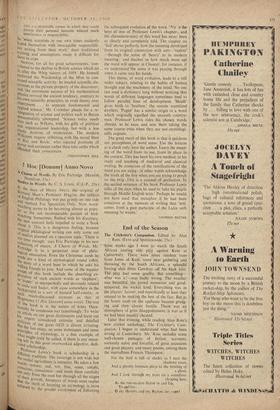? Hoc IDonumi Anno Novo
Studies in Words. By CSLewis.(C.U.P., 21s.)
lthe days of Henry Sweet. the original of Bernard Shaw's Professor Higgins, the subject °f English Philology was put grimly on one side and marked For Specialists Only. Now word- watching seems to be becoming almost as popu- lar as the not incomparable pursuit of bird- watching. Sometimes, flushed with his discovery, the new convert feels impelled to write a book about it. '1 his is a dangerous feeling, because original philological writing can only come out of studies planned on a spacious scale. 'There is net time enough,' says Eric Partridge in his new PIlection, of essays, A Charm ()f Words. Mr. rrtridge is in a perpetual state of philo- egical emanation. Even the Christmas cards he
sends are a kind of etymological round robin, the
Story of a word hunt 'in which he asks his willing friends to join. And some oL the meatier scraps of this book include the absorbing ex- Plnration of such ancient words as `elephant'; to 'Water,' so unexpectedly and deviously related b" andd hudor, with aqua somewhere in the ackground as a sort of bastard half-cousin : or .titch much-discussed etymons as that of NManay (? Hoc Warrant] wino novo). The rest (),E. the book is in the nature of notes. Occa- ionally he condenses too tantalisingly. To write fits article on our great dictionaries and leave out "nS expert considered estimate and detailed criticism of our great OED is almost irritating. nut the last essay, on some techniques and some principles of etymology, is a fine example of _nat might truly be called, if there is any mean- ing left in this poor overworked adjective, dedi- cated scholarship. professor Lewis's book is scholarship -in a different tradition. The coverage is not wide but the verbal agriculture is intensive. He takes a few e ords----nature, sad, wit, free, sense, simple, oft only conscience—and tends them carefully Only from the root but through all the stages ttn their growth. Amateurs of words soon realise that the thrill of learning an etymology is soon eclipsed by the greater excitement of following the subsequent evolution of the word. 'Wit ';s the hero of one of Professor Lewis's chaptem, and the chameleon-story of this word has never been so clearly and completely told. The chapter on 'Sad' shows perfectly how the meaning developed from its original connection with satis--`replete' ----through the sense of 'heavy' to its modern meaning: and teaches us how much more apt the word will appear in Chaucer, for instance, if we understand 'the sense it was passing through when it came into his hands.
This theme, of word evolution, leads to a still wider subject, relating to the habits of human thought and the machinery of the mind. No one can read a dictionary long without noticing that words of different languages sometimes tend to follow parallel lines of development. 'Heath' gives birth to 'heathen,' the remote wasteland dwellers. 'Pagan' has a similar origin in a word which originally signified the uncouth country- man. Professor Lewis rides his chosen words abreast, as he says, and sees them taking the same course even when they are not etymologi- cally cognate.
The great merit of this book is that it quickens our perceptions of word sense. Use the lexicon as a check only, says the author. Learn the mean- ing of the word from its use, from its place in the context. This has been his own method, in his study and teaching of mediaeval and classical writing. Be conscious of the ramifications of the word you are using: in other words acknowledge the trunk of the tree when you are trying to perch on the twig.. This is a counsel of perfection. In the second sentence of his book Professor Lewis talks of the days when he used to 'take his pupils through Middle English texts.' Perhaps he would not have used that metaphor if he had been conscious at the moment of writing that 'text' comes from a past participle of the Latin verb meaning `to weave.'
S 1.1 AM EN POTTER






































 Previous page
Previous page